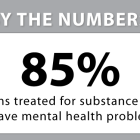
A four-year study of the juvenile justice system in California unveils alarming mental health problems:
An estimated 50% of teens arrested in California have a suspected mental illness. 75% have a substance abuse problem
The Healthy Returns Initiative is searching for ways to improve treatment options and outcomes for young offenders. The study reports on conditions in California’s Juvenile Justice System which sound a lot like conditions in Georgia: State and local budget cuts, insufficient staff to handle kids with mental health problems, shortage of placement options for children with severe mental illness and substance abuse. The Initiative worked with 5 counties, both urban and rural, to identify teens with problems. They found the key is routine, standardized mental health screening at the earliest point of contact with the system. They conclude ignoring mental health issues leads to longer and more costly stays in detention. Read more in the Sacramento Bee




